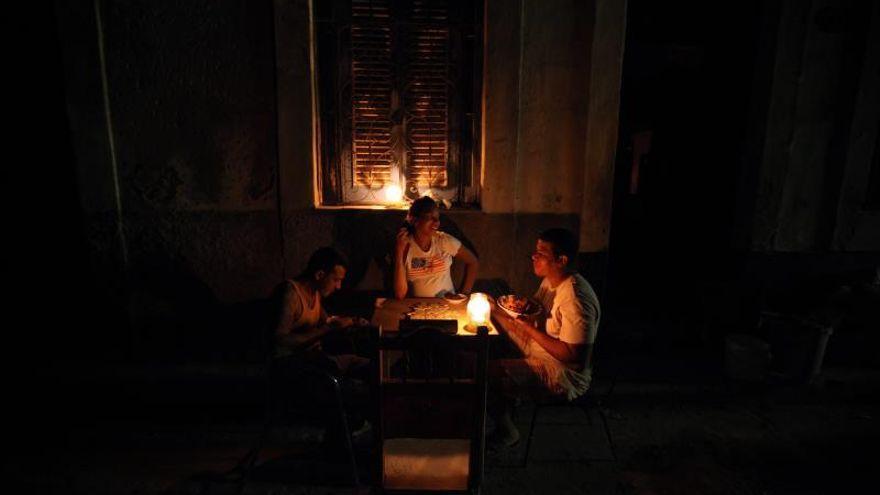
![]() 14ymedio, Havana, 4 November 2020 — Concern for the electricity sector is growing among the authorities, who are not willing to let a kilowatt escape without payment. A week after learning about the serious crisis in the Electric Company’s accounts in several provinces, Jorge Estrada, chief of commercial inspectors in Guantánamo, told the local newspaper Venceremos that 22 “fraud hunters” are being trained in the province.
14ymedio, Havana, 4 November 2020 — Concern for the electricity sector is growing among the authorities, who are not willing to let a kilowatt escape without payment. A week after learning about the serious crisis in the Electric Company’s accounts in several provinces, Jorge Estrada, chief of commercial inspectors in Guantánamo, told the local newspaper Venceremos that 22 “fraud hunters” are being trained in the province.
The young people began their training for the inspection task in September and will finish in December, ready to strengthen the system of control over power usage. Trainees must have passed the twelfth grade and have knowledge of the sector. The course contents range from business mathematics to legislation, through measurements, and reading and knowledge of meter-counting equipment.
Velázquez explained that the effort will aim to detect fraud in the state and residential sectors based on the accumulated experience of known violations of regulations. In addition, he detailed that the course emphasizes the “conduct of the inspector in the event of the appearance of fraud, because in addition to following a well-defined protocol that includes notification, creation of a file, the calculation of the charges owed by the home and retroactive energy use… the inspector must be ethical and act fairly. “
In the last year, the account balances of the state electricity company have deteriorated. The arrival of the pandemic forced the closure of the offices where the majority of Cubans pay their bills and the authorities granted a grace period during which people could choose to satisfy the amounts to be paid in order not to accumulate debts or postpone the payment until the office re-opened.
This mechanism has been a problem for the company, which two weeks ago reported that in Santiago de Cuba non-payments totaled 6.9 million pesos for the residential sector and 0.5 million in the state sector, so it proceeded to cut electricity to 8,800 homes.
In Havana, where the offices went through two closure periods, one in the spring and one in September due to the reemergence of the virus, the situation is even worse. Leisy Hernández González, commercial director, said that the company barely collects 52% of what is owed, which “affects its financial status, on which the continuity of its operations and the payment of workers depend.”
In addition, the company had to pay its debts to the Central Bank of Cuba to maintain supply to the defaulters, and develop a payment schedule for all those affected by the last closure. Although payments can be made more flexible, she stressed that the company is not going to stop charging for something so precious in Cuba.
Since Cuban President Miguel Díaz-Canel announced the arrival of an energy crisis in September 2019, which he described as “temporary,” the authorities’ calls to save energy have not paused, month after month. In most provinces, consumption forecasts have been constantly exceeded in a context in which this is unsustainable, since oil from Cuba’s Venezuelan ally is increasingly arriving drop by drop, despite the help from Iran to supply the Island from Caracas. .
In April, energy consumption increased with the call to stay at home to contain the Covid-19 contagion, leading to a 10% rise in national energy use, despite the paralysis at that time of large consumers, such as hotels and non-essential businesses. The authorities did not hesitate to ask the population to hold back, telling people the waste is their fault.
In August, after another deviation from the forecasts, by just 1.1%, Deputy Prime Minister Ramiro Valdés Menéndez even asked the municipal energy councils to identify the high consumers in residences and state services.
The Electricity Union had warned in July, through the State newspaper Granma, that it was preparing to apply sanctions in Havana for fraud in consumption according to article 325 of the Penal Code, which establishes prison sentences from three months to one year, and/or payment of 100 to 300 ‘shares’*.
In 2019 the company imposed 17,000 fines for the loss of 2.1 megawatts. In Havana last year 2,752 fines were imposed due to electricity fraud involving over 6.46 gigawatts.
In Cuba, there are frequent cases of manipulation of the meter to evade the total payment of the electricity bill and also the so-called “clotheslines” — makeshift wiring that transfer the electricity from a line to homes or private businesses with high consumers. In illegal housing settlements, theft of supplies to light up makeshift homes is also common.
*Translator’s note: Cuban penal codes set fines as a number of “shares” with the value of a single share defined in the code. In this way, all fines can be changed simultaneously by revising the definition of the value of one “share.”
____________
COLLABORATE WITH OUR WORK: The 14ymedio team is committed to practicing serious journalism that reflects Cuba’s reality in all its depth. Thank you for joining us on this long journey. We invite you to continue supporting us by becoming a member of 14ymedio now. Together we can continue transforming journalism in Cuba.
